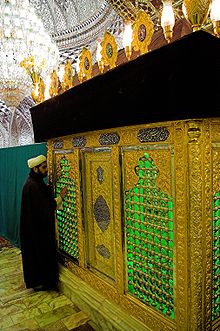- Mullah
-
Part of a series on Islam
Usul al-fiqh
(The Roots of Jurisprudence)Fiqh - Quran and Sunnah
- Taqlid (imitation)
- Ijtihad (interpretation)
- Ijma (consensus)
- Madh'hab (school of law)
- Minhaj (method)
- Qiyas (analogical reasoning)
- Urf (society custom)
- Bid‘ah (innovation)
- Madrasah (school/seminary)
- Ijazah (authorization)
- Istihlal (legalization)
- Istihsan (discretion)
- Risalah (dissertation)
Ahkam Scholarly titles - Mujtahid (scholar of Islamic law with comprehensive understanding of the texts and reality)
- Marja (authority)
- Alim (scholar; pl. Ulema)
- Mufti (cleric)
- Mufassir (interpreter)
- Qadi (judge)
- Faqīh (professional counselor/jurist)
- Muhaddith (narrator)
- Mullah (scholar; pl. Ulema)
- Imam (Sunni and Shia)
- Mawlawi (scholar; pl. Ulema)
- Sheikh (elderly person, respected person, also sometimes scholar; pl. Ulema)
- Mujaddid (renewer)
- Hafiz
- Hujja
- Hakim
- Amir al-Mu'minin in reg. hadith
- Maulana (scholar; pl. Ulema)
Mullah ( ملا) is generally used to refer to a Muslim man, educated in Islamic theology and sacred law. The title, given to some Islamic clergy, is derived from the Arabic word مَوْلَى mawlā , meaning "vicar", "master" and "guardian". In large parts of the Muslim world, particularly Iran, Bosnia, Afghanistan, Turkey, Central Asia, Somalia and South Asia, it is the name commonly given to local Islamic clerics or mosque leaders.[1]
The title has also been used in some Sefardic Jewish communities to refer to the community's leadership, especially religious leadership.[2]
It is primarily understood in the Muslim world as a term of respect for an educated man.[3]
Contents
Training and duties
Ideally, a trained mullah will have studied Islamic traditions (hadith), and Islamic law (fiqh). They are often hafiz, i.e. have memorized the Qur'an. However, uneducated villagers often recognize a literate Muslim with a less than complete Islamic training as their "mullah" or religious cleric. Mullahs with varying levels of training lead prayers in mosques, deliver religious sermons, and perform religious ceremonies such as birth rites and funeral services. They also often teach in a type of Islamic school known as a madrasah. These three kinds of knowledge are applied mostly in interpreting Islamic texts (i.e. the Quran, Hadiths, etc.) for matters of Shariah, i.e. Islamic law.
Usage
The term is most often applied to Shi'ite clerics, as Shi'a Islam is the predominant tradition in Iran. However, the term is very common in Urdu, spoken throughout Pakistan, and it is used throughout the Indian subcontinent for any Muslim clergy, Sunni or Shi'a. Muslim clergy in Russia and other former Soviet Republics are also referred to as mullahs, regardless of whether they are Sunni or Shi'a.
It has been used among Persian Jews, Bukharan Jews, Afghani Jews and other Central Asian Jews to refer to the community's religious and/or secular leadership.
The term is seldom used in Arabic-speaking areas, where its nearest equivalent is shaykh (implying formal Islamic training), imam (prayer leader; not to be confused with the Imams of the Shiite world), or `ālim (plural `ūlamā') (scholar; see ulema). In the Sunni world, the concept of "cleric" is of limited usefulness, as authority in the religious system is relatively decentralized.
The term is frequently used in English, although English-speaking Muslim clergy rarely call themselves mullahs. It was adopted from Urdu by the British rulers of India and subsequently came into more widespread use.
Mullahs have frequently been involved in politics, but only recently have they actually taken power. Islamists seized power in Iran in 1979, and later, in Afghanistan under the Taliban.
In Kaifeng, China, the Jews in China who managed the synagogue were called "Mullahs".[4]
Usage as a derogatory term
Iran
Until early 20th century, the term mullah was used in Iranian hawzas (seminaries) to refer to low-level clergy who specialized in telling stories of Ashura, rather than teaching or issuing fatwas. Today, the term is sometimes used as a derogatory term for any Islamic cleric. It is common in Iran to refer to an ayatollah or other high level clerics, as a mullah, to ridicule his religious authority.[citation needed] In recent years, at least among Shia mullahs, the term ruhani (spiritual) has been promoted as an alternative to mullah and akhoond, free of pejorative connotations.[5]
See also
- Maulvi
- Maulana
- Mullah Mohammed Omar
- Mullah Nasruddin
- Ulema
- International Imam Organization
References
 This article incorporates text from Chinese and Japanese repository of facts and events in science, history and art, relating to Eastern Asia, Volume 1, a publication from 1863 now in the public domain in the United States.
This article incorporates text from Chinese and Japanese repository of facts and events in science, history and art, relating to Eastern Asia, Volume 1, a publication from 1863 now in the public domain in the United States.- ^ Roy, Olivier (1994). The Failure of Political Islam. Cambridge, Massachusetts: Harvard University Press. pp. 28–9. ISBN 0674291409.
- ^ See for example: Rabbinic Succession in Bukhara 1790-1930,
- ^ Taheri, Amir (1985). The spirit of Allah : Khomeini and the Islamic revolution. Bethesda, Md.: Adler & Adler. pp. 53. ISBN 091756104X.
- ^ Chinese and Japanese repository of facts and events in science, history and art, relating to Eastern Asia, Volume 1. Oxford: s.n.. 1863. p. 48. http://books.google.com/books?id=04kdAAAAMAAJ&q=mohammedan#v=snippet&q=mohammedan%20roll%20law%20purchase&f=false. Retrieved 2011-7-06.(Original from the University of Michigan)
- ^ Momen, Moojan, An Introduction to Shi'i Islam, Yale University Press, 1985, p.203
Categories:- Islamic Persian honorifics
- Islamic terms
- Islamic Urdu honorifics
- Religious leadership roles
- Sharia
- Quran and Sunnah
Wikimedia Foundation. 2010.

